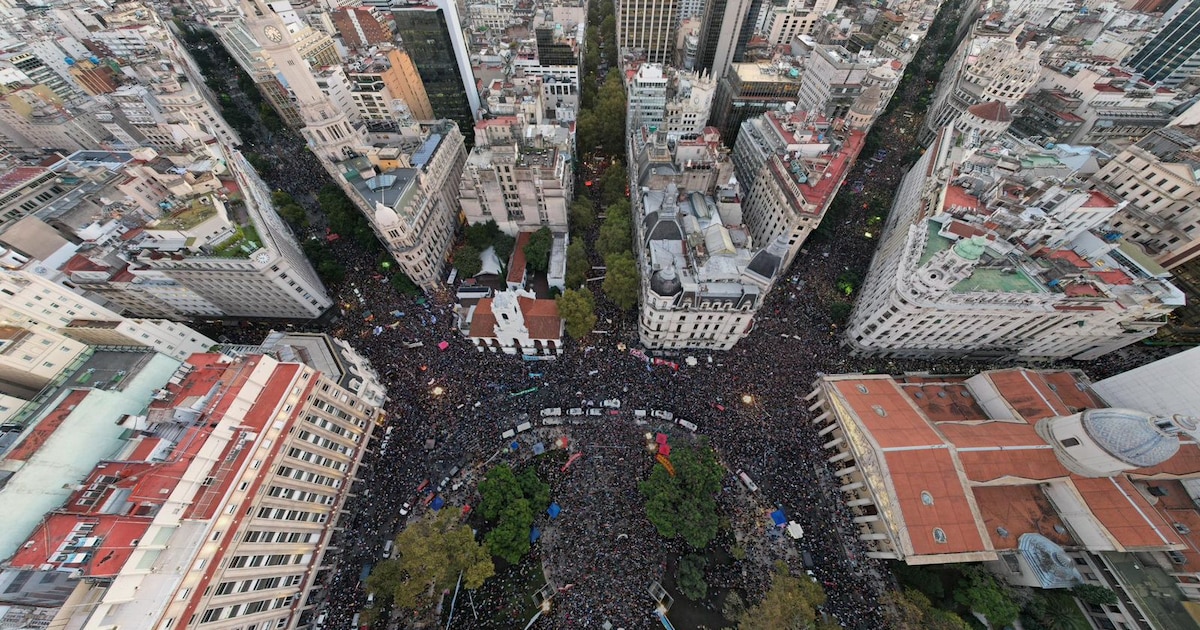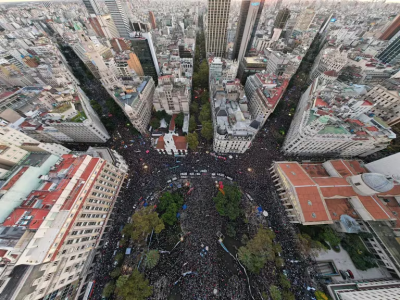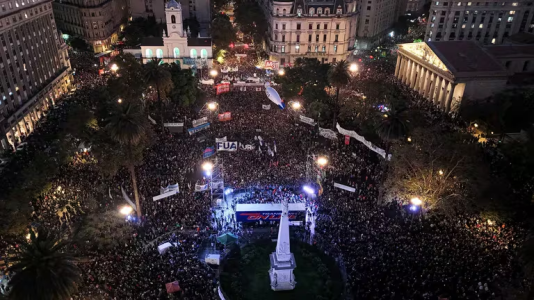All the Answers
Well-known member
A crowd defended the value of public education and called for a limit to adjustment in universities - Infobae

Source:

Una multitud defendió el valor de la educación pública y pidió un límite al ajuste en las universidades
La masiva convocatoria rechazó el drástico recorte presupuestario y reclamó preservar la educación como factor clave para el desarrollo. Pidieron una mesa de diálogo pero el Gobierno por ahora no cede. Detalles de una jornada histórica y una encuesta con datos elocuentes
April 24, 2024
The massive call rejected the drastic budget cut and demanded to preserve education as a key factor for development. They asked for a dialogue table but the Government is not giving in for now. Details of a historic day and a survey with eloquent data
By Facundo Chaves

From the drone. The demonstration in defense of public education occupied the entire Plaza de Mayo and extended to 9 de Julio Avenue
It was a lot of people. Hundreds of thousands of Argentines. It was a political event of such a massive dimension that it became irrelevant to specify whether there were 180 thousand, as the Government said sotto voce , or a million souls, as the organizers proposed. It was certainly a crowd that mobilized to defend the value of public education and to ask for a limit to the drastic adjustment of the budget allocated to national universities.
It was a march that, although it had echoes in almost all the provinces, the epicenter occurred in a handful of blocks in downtown Buenos Aires. Those summoned marched from Plaza Houssay, the university heart of the city of Buenos Aires, and from the National Congress, and ended up as close as they could to a crowded Plaza de Mayo, where a stage was set up from which a document titled “The public university: basis of democracy and social development . ” Although partisan criticism was filtered, the bulk of the message was focused on demanding the money necessary to avoid a virtual educational blackout.

Cenital. An aerial image of the moment of greatest concentration of people in Plaza de Mayo (photo Martín Cossarini)
The mobilization was organized by the community of public universities - with rectors, students, teachers and non-teachers and unions - after weeks of negotiations that went nowhere between the National Interuniversity Council, the Argentine University Federation and union sectors with the Government. . The march - which, due to its volume, made Patricia Bullrich's anti-picketing protocol inapplicable - had massive support from the different sectors of Peronism, from picketers and unionists from the CGT and the two CTA, as well as from important sectors of the UCR and a minority of the PRO.
Beyond the massive call, Javier Milei's government reacted without surprises. He rejected the claims, ratified the policy of budgetary austerity and put in the middle of the discussion the demand that universities accept a regime of audits on the funds they manage that is different from that established by current legislation. The Auditor General of the Nation, which depends on Congress, is the one in charge of supervising expenses. Beyond the discussion, the President was true to himself and redoubled the bet. “ Glorious day for the beginning of revelation. Whoever wants to hear (see), let him hear (see)... Long live fucking freedom ,” he posted on Instagram, with a caricature of a lion drinking from a bowl with the legend “left-handed tears.”

Clear message. Milei's position was known through a post that she published shortly after finishing the march through the universities.
The post came after the closing speech given by the president of the Argentine University Federation (FUA), Piera Fernández: “We do not want our dreams to be taken away from us: our future does not belong to them. We are proud sons and daughters of the Argentine University; We are the public University, free and unrestricted in admission, of excellence, with freedom and equity. We are the University for the great Argentine people. For this reason, we will fight, in an inalienable democratic and peaceful resistance, for the education we want, for the country we long for .”
The leader, who comes from the National University of Río Cuarto, Córdoba, had previously raised the need for more budget: “We reached March 2024 with an expenditure budget at values of September 2022. The 70% increase in these items , arranged for the month of March and not yet paid, plus the recent announcement, within the framework of this call, of an additional 70%, constitute an incentive that is still insufficient, while inflation was 300% in the same period of time".
It was the central section of a speech that was heard after several union leaders, teachers, non-teachers and rectors who referred to the university issue spoke. And two messages that caused a certain stir due to the tone they had: that of the president of the Mothers of Plaza de Mayo Línea Fundadora, Taty Almeyda, and that of the Nobel Peace Prize winner, Adolfo Pérez Esquivel.
Those words seemed to confirm - along with the presence of Peronist leaders and the high profile that Cristina Kirchner decided to have - a partisanship of the university claim and the mutation of a transversal demand of society to a mere opposition political act. The person in charge of stating it clearly was, in his morning press conference, the spokesperson Manuel Adorni, who spoke of a “ ghost train .” As he often says in private and sometimes in public, he speaks for the President.

The box from where the demands to the national government for more budget were read (photo Nicolás Stulberg)
“Who went up and who organized that stage?” Infobae asked several leaders who participated in the organization of the event. And everyone agreed that there was an agreement between the Trade Union Front of National Universities, the FUA and the National Interuniversity Council (CIN) for all those who were at the top and those who spoke. “Everyone loves and values Taty Almeyda and Pérez Esquivel is a personality with international recognition; We do not allow politicians or governors to board, even though they asked for it ,” acknowledged the sources consulted.
In addition to the tens of thousands of Argentines who mobilized to defend the value of public education, there were also opposition leaders who participated in the largest mobilization since Javier Milei assumed the Presidency. In addition to CFK, there was a thick column from La Cámpora headed by Eduardo De Pedro; the leader of the Renovador Front, Sergio Massa, and his wife Malena Galmarini, who went to accompany his children Tomás and Milagros; and the president of the UCR and senator Martín Lousteau. Also, the general secretaries of the CGT Pablo Moyano and Héctor Daer, along with a large group of members of the labor movement; PRO senator Guadalupe Tagliaferri, while the former head of Government, Horacio Rodríguez Larreta, supported the march with a photo that was taken on Monday in front of the Faculty of Economic Sciences. And the leadership and militancy of the Civic Coalition of Elisa Carrió.
All the leaders and members of the political parties and unions, at the request of the organizers, remained behind the head of the mobilization that was occupied by the members of the university and educational community, who were the ones who managed to transmit a call that highlighted the commitment of Argentine society to public education - especially higher education - as a tool for upward social mobility.
“ Society showed that it wants to defend public universities, because it is one of the few quality things that the State provides ,” said Emiliano Yacobitti in dialogue with Infobae.
A key survey
This Tuesday's mobilization occurred on land that was suitable for being irrigated with people after long months of drought and the accumulation of unsatisfied demands. The contribution of pollster Federico Aurelio, from the consulting firm Aresco, is key to understanding the context, the protagonists and the scene that occurred with the crowd mobilized by public education and universities.“It is the first important discussion in which the position of Milei and the Government is clearly a minority. Of all the discussions he had so far, the ruling party was balanced in some, in most of them there were more people in favor of him than against, but in this one his position was clearly in the minority. “Three out of four Argentines disagreed with the adjustment of university allocations,” explained the public opinion expert.
Federico Aurelio confirms with data something that is intuited: “There is a favorable assessment of the academic evaluation of public universities and with respect to some of the accusations raised by the Government about alleged bad administration, it is not so clear to people that they have a maladministration".
“There is a shield on the part of the majority of society, in favor of public universities, in the same way that Milei has a shield today in the context of the economic crisis. Public universities are something that most Argentines do not want to be touched, that is why Milei faces an argument where he had more to lose, but he still plays at full speed in all the plays, in which he knows he is going to win and in which he knows he is going to lose,” explained the political analyst.
And he stressed that although “it is not among the priority problems of Argentines, universities are important as a symbol.” “It is an issue that hits very hard to the segment that gave him the greatest support electorally and in which he had the best assessment of the management, which are young people and those in the middle and high socioeconomic levels. This points to the segment that gave him the greatest support, so we will have to see the political consequences of this conflict,” he considered.
It is a scenario that puts the Government at risk at a time of high risk, due to the impact on the real economy of the ultra-orthodox adjustment measures that it has been applying, the arrival of rate increases, and the accumulation of street complaints that picketers and unionists have already announced. “From today we expect a change in attitude and if not, we will continue organizing collectively as we are doing, because we are not willing to put our right to study at risk, we are not willing to put the university at risk. If that does not happen, we will continue fighting,” Piera Fernández warned.

